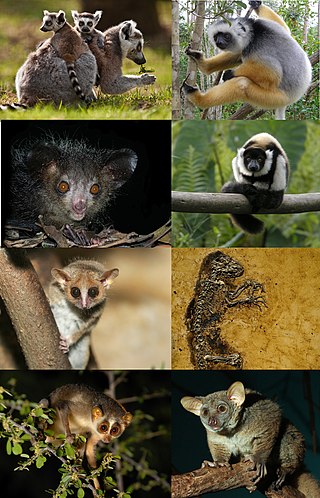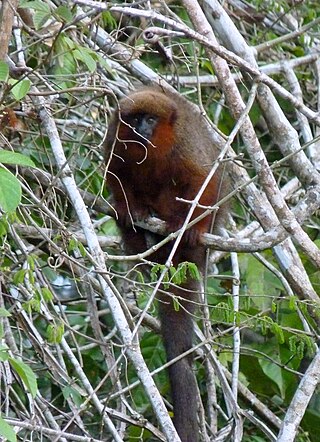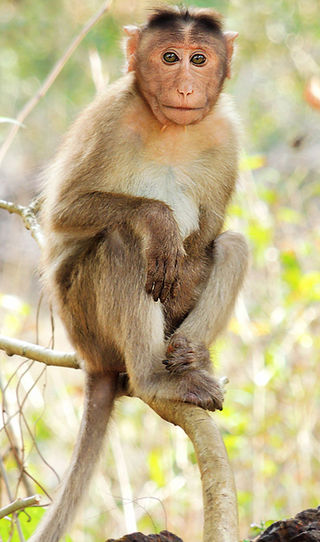Primate's Palace may refer to the following buildings:
- Primate's Palace, Bratislava, Slovakia.
- Primate's Palace, Warsaw, Poland.
Primate's Palace may refer to the following buildings:

The archbishop of Canterbury is the senior bishop and a principal leader of the Church of England, the ceremonial head of the worldwide Anglican Communion and the bishop of the Diocese of Canterbury. The current archbishop is Justin Welby, who was enthroned at Canterbury Cathedral on 21 March 2013. Welby is the 105th person to hold the position, as part of a line of succession going back to the "Apostle to the English" Augustine of Canterbury, who was sent to the island by the church in Rome in 597. Welby succeeded Rowan Williams.

Primates are a diverse order of mammals. They are divided into the strepsirrhines, which include the lemurs, galagos, and lorisids, and the haplorhines, which include the tarsiers and the simians. Primates arose 85–55 million years ago first from small terrestrial mammals, which adapted to living in the trees of tropical forests: many primate characteristics represent adaptations to life in this challenging environment, including large brains, visual acuity, color vision, a shoulder girdle allowing a large degree of movement in the shoulder joint, and dextrous hands. Primates range in size from Madame Berthe's mouse lemur, which weighs 30 g (1 oz), to the eastern gorilla, weighing over 200 kg (440 lb). There are 376–524 species of living primates, depending on which classification is used. New primate species continue to be discovered: over 25 species were described in the 2000s, 36 in the 2010s, and three in the 2020s.

Strepsirrhini or Strepsirhini is a suborder of primates that includes the lemuriform primates, which consist of the lemurs of Madagascar, galagos ("bushbabies") and pottos from Africa, and the lorises from India and southeast Asia. Collectively they are referred to as strepsirrhines. Also belonging to the suborder are the extinct adapiform primates which thrived during the Eocene in Europe, North America, and Asia, but disappeared from most of the Northern Hemisphere as the climate cooled. Adapiforms are sometimes referred to as being "lemur-like", although the diversity of both lemurs and adapiforms does not support this comparison.

Oliver was a former "performing" chimpanzee once promoted as a missing link or "humanzee" due to his somewhat human-like appearance and a tendency to walk upright. Despite his somewhat unusual appearance and behavior, scientists found that Oliver was not a human-chimpanzee hybrid.

Lemurs are wet-nosed primates of the superfamily Lemuroidea, divided into 8 families and consisting of 15 genera and around 100 existing species. They are endemic to the island of Madagascar. Most existing lemurs are small, have a pointed snout, large eyes, and a long tail. They chiefly live in trees and are active at night.

The philtrum, or medial cleft, is a vertical indentation in the middle area of the upper lip, common to therian mammals, extending in humans from the nasal septum to the tubercle of the upper lip. Together with a glandular rhinarium and slit-like nostrils, it is believed to constitute the primitive condition for at least therian mammals. Monotremes lack a philtrum, though this could be due to the specialised, beak-like jaws in living species.

The Madidi titi monkey, also known as the GoldenPalace.com monkey or the golden palace monkey, is a titi, a kind of New World monkey, discovered in western Bolivia's Madidi National Park in 2004. Its scientific name is Plecturocebus aureipalatii, the specific epithet meaning "of the Golden Palace", in reference to GoldenPalace.com, an online casino which paid US$650,000 to have the species named after it, with benefits going toward the nonprofit organization that maintains the park where the titi was discovered.

The Anglican Communion Primates' Meetings are regular meetings of the primates in the Anglican Communion, i.e. the principal archbishops or bishops of each ecclesiastical province of the Anglican Communion. There are currently 38 primates of the Anglican Communion. The primates come together from the geographic provinces around the world for discussion and consultation. As primus inter pares of the communion, the Archbishop of Canterbury chairs the meetings, with the Secretary General of the Anglican Consultative Council (ACC) serving as secretary.
Neontology is a part of biology that, in contrast to paleontology, deals with living organisms. It is the study of extant taxa : taxa with members still alive, as opposed to (all) being extinct. For example:
Dunbar's number is a suggested cognitive limit to the number of people with whom one can maintain stable social relationships—relationships in which an individual knows who each person is and how each person relates to every other person.

Monkey is a common name that may refer to most mammals of the infraorder Simiiformes, also known as the simians. Traditionally, all animals in the group now known as simians are counted as monkeys except the apes, which constitutes an incomplete paraphyletic grouping; however, in the broader sense based on cladistics, apes (Hominoidea) are also included, making the terms monkeys and simians synonyms in regard to their scope.

Michael Bruce Curry is an American bishop who is the 27th and current presiding bishop and primate of The Episcopal Church. Elected in 2015, he is the first African American to serve as presiding bishop in The Episcopal Church. He was previously bishop of the Diocese of North Carolina.
A primate is any member of the biological order of Primates, including monkeys, apes, and humans.

Darwinius is a genus within the infraorder Adapiformes, a group of basal strepsirrhine primates from the middle Eocene epoch. Its only known species, Darwinius masillae, lived approximately 47 million years ago based on dating of the fossil site.
Mollard may refer to :

The Primate's Palace is a historical palace at the Senatorska Street in the Śródmieście district of Warsaw, Poland.

Grigore Gavrila Maior, O.S.B.M., was Bishop of Făgăraş and Primate of the Romanian Greek Catholic Church from 1773 to his resignation in 1782.
Primate of Canada may refer to:
Fiach is an Irish male given name. It may refer to:

The evolutionary history of the primates can be traced back 57-90 million years. One of the oldest known primate-like mammal species, Plesiadapis, came from North America; another, Archicebus, came from China. Other similar basal primates were widespread in Eurasia and Africa during the tropical conditions of the Paleocene and Eocene. Purgatorius is the genus of the four extinct species believed to be the earliest example of a primate or a proto-primate, a primatomorph precursor to the Plesiadapiformes, dating to as old as 66 million years ago.